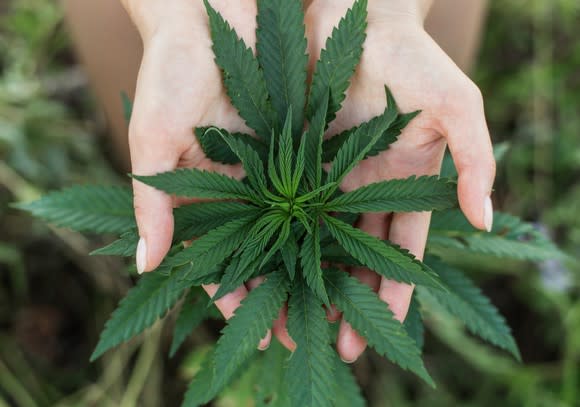More Than 2 Out of 3 Pot Users Drove High Within the Past Year, New Survey Shows
In case you haven't noticed, the legal marijuana movement is creating quite the buzz on Wall Street. Since the start of 2016, a number of the largest pot companies by market cap have seen their share prices rise by more than 1,000%.
What's the buzz behind pot stocks?
Why all the hoopla, you wonder? It has to do with a combination of rapidly growing sales, a consistent shift in the public's opinion on cannabis, and a "marijuana first" expected out of Canada later this year.

Image source: Getty Images.
In terms of sales, the North American legal cannabis industry tallied $9.7 billion in revenue in 2017, up 33% from the previous year, according to research firm ArcView, in partnership with BDS Analytics. Moving forward, this duo is projecting a compound annual growth rate of 28% through 2021, with sales reaching as high as $47 billion by 2027.
As for the perception of pot, more Americans than ever now favor its legalization. Five separate polls over the trailing year – CBS News, Gallup, Fox News, Pew Research Center, and the independent Quinnipiac University – have all shown support ranging from 59% to 64% for legalizing cannabis. Quinnipiac's August survey also showed overwhelming support (94%) for the idea of green-lighting medicinal marijuana in the United States.
Finally, there's a lot of excitement surrounding bill C-45 in Canada. The Cannabis Act, as C-45 is better known, is expected to result in recreational pot being legalized in Canada by this summer. This would make Canada the first developed country in the world to have legalized marijuana, and it could pave the way for $5 billion or more in annual sales.
Legal cannabis is going virtually nowhere in the U.S.
Within the United States, however, the legal cannabis industry is stuck in neutral, at least at the federal level. Despite almost three-fifths of U.S. states having legalized pot in some capacity -- including nine states that approved recreational marijuana – and five national surveys demonstrating strong support for legalization, the federal government has dug in its heels.

Image source: Getty Images.
Currently a Schedule I drug, cannabis is wholly illegal, putting it on par with LSD and heroin. Furthermore, it's considered highly prone to abuse, and isn't recognized as having any medical benefits as a result of its federal scheduling.
This scheduling can make life exceptionally difficult for patients and/or marijuana-based businesses in the United States. For instance, businesses often struggle to access basic financial services, which can include something as simple as a checking account. Since financial institutions report to the Federal Deposit Insurance Corporation (FDIC), and the FDIC is a federally created entity, the belief is that under a strict interpretation of federal law, financial institutions that offer financial services to pot businesses could be fined or criminally charged.
Why won't Congress budge? Primarily because there are a handful of benefit-versus-risk concerns that can only be answered through long-winded studies. Without this data, lawmakers have little incentive to change marijuana's classification, short of being voted out of office on account of their view of cannabis. These concerns typically revolve around keeping adolescents away from pot, as well as ensuring that drivers under the influence of cannabis are dealt with harshly.
This isn't going to help the legal pot industry's case for legalization
This past week, however, an online survey conducted by the Colorado Department for Transportation (CDOT) revealed that the concerns of lawmakers may indeed be valid.
Back in February, CDOT launched a campaign known as "The Cannabis Conversation" to gather information and feedback on cannabis use and behaviors within the state. As a reminder, Colorado was among the first two states (along with Washington state) to have voted to legalize recreational marijuana back in November 2012. Last year, the state racked up $1.49 billion in combined medical and recreational pot sales.

Image source: Getty Images.
The survey, which was taken online by more than 11,000 anonymous marijuana users and non-users, showed that 69% of the cannabis users admitted to driving high within the past year. What's more, 27% of pot users admitted to driving high almost daily.
Just as interesting were the responses to questions regarding the perception of driver impairment. Just over a third of the respondents (34%) suggested that consuming cannabis doesn't impact their ability to drive, with another 10% intimating that it makes them drive better. That's close to half of all participants in this survey under the impression that using cannabis is essentially a non-factor behind the wheel.
However, studies conducted by the National Institute on Drug Abuse have found that "marijuana significantly impairs judgment, motor coordination, and reaction time, and studies have found a direct relationship between blood THC [tetrahydrocannabinol, the psychoactive component of cannabis] concentration and impaired driving ability."
In other words, Colorado cannabis users are setting a poor example that's only likely to cause Congress to dig in its heels even more on the drug's current scheduling.
An intriguing technology that's still in its infancy
What this study also demonstrates is the growing need for tools that law enforcement can use to detect impairment, beyond just visual tests.
One of the biggest issues with cannabis use is there are no "line in the sand" figures that law enforcement can reference compared to, say, alcohol use. With alcohol consumption, law enforcement can use a breathalyzer to determine a person's blood alcohol content (BAC). If a person's BAC is 0.08% or higher, that's an arrestable offense. There are no clear impairments levels for cannabis use, which makes enforcing the law somewhat of a gray area.

Image source: Getty Images.
Making matters even more difficult, cannabis metabolizes through the system differently than alcohol. The THC found in cannabis can remain in a person's system for days or weeks after use, which makes deciphering recency of use difficult for law enforcement.
The solution might just be a number of next-generation dual breathalyzers that can be used for alcohol and cannabis consumption. Most importantly, they can be used to determine recency of use, which would be critical in terms of keeping our roads safe. Admittedly, this is a technology that's still in its infancy, albeit a few developers have tested their product in the real world. Nonetheless, marijuana breathalyzers aren't yet ready for mass adoption by police departments. Until they are, I doubt Congress alters its scheduling on cannabis.
For the investing community, this means a suggested and ongoing avoidance of U.S.-based pot stocks. While all marijuana stocks come with their own unique set of risks, Canadian cannabis stocks present a far more favorable long-term view for investors than U.S.-based ones, mainly as a result of the expected legalization of adult-use pot by this summer. If you want to roll the dice on the cannabis industry, I'd strongly advise you to examine stocks north of the U.S. border.
More From The Motley Fool
The Motley Fool has a disclosure policy.

 Yahoo Finance
Yahoo Finance 